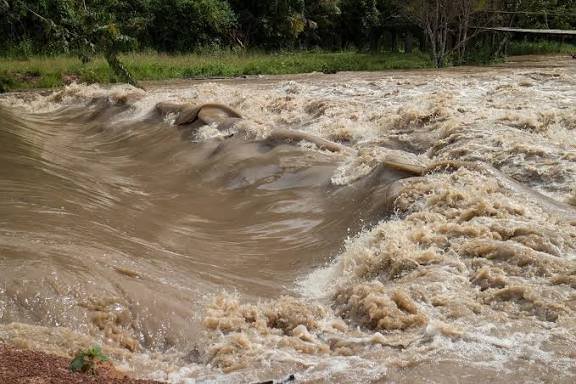FG Predicts Fresh Flooding in Lagos, 13 Other States as Rainy Season Intensifies
ABUJA, Nigeria – The Federal Government has issued a stern warning of impending flooding in Lagos and 13 other states across Nigeria, urging immediate precautionary measures as the rainy season reaches its peak. The alert was reported by Punch Nigeria following an announcement by the National Emergency Management Agency (NEMA).
The forecast comes amid increasingly unpredictable weather patterns and highlights the persistent vulnerability of many Nigerian communities to seasonal flooding, which has historically caused significant damage to infrastructure, agriculture, and livelihoods, while displacing thousands of citizens annually.
States at Risk and Projected Impact
According to the government’s meteorological agencies, the states expected to be most affected include Lagos, Rivers, Delta, Bayelsa, Cross River, Akwa Ibom, and several others in coastal and low-lying regions. The prediction is based on analysis of rainfall patterns, river water levels, and satellite monitoring data.
As documented by Reuters, previous flooding events in these regions have led to substantial economic losses and humanitarian challenges, with the 2022 floods being particularly devastating, displacing over 1.4 million people and claiming hundreds of lives across the country.
Climate Context and Increasing Frequency
Nigeria’s flooding challenges have been exacerbated by climate change, which has intensified rainfall patterns and increased the frequency of extreme weather events. Rapid urbanization, inadequate drainage systems, and constructions on natural floodplains have further amplified vulnerability.
A Bloomberg analysis highlighted how African megacities like Lagos face particularly acute challenges due to their coastal locations, rapid population growth, and infrastructure that struggles to keep pace with development and climate pressures.
Economic Implications and Infrastructure Vulnerabilities
Recurring floods pose significant threats to Nigeria’s economy, damaging critical infrastructure, disrupting agricultural production, and impeding transportation networks. Lagos, as the nation’s economic hub, faces particularly severe potential losses given its concentration of commercial activity and infrastructure.
According to the World Bank’s assessment, flood damage to infrastructure and property represents a major drain on Nigeria’s economic resources, with climate adaptation and resilient infrastructure becoming increasingly urgent priorities for sustainable development.
Government Preparedness and Response Measures
NEMA has outlined a multi-agency approach to flood response, involving coordination with state emergency management agencies, the Meteorological Agency, and hydrological services. Preparedness measures include:
- Early warning dissemination to communities at risk
- Prepositioning of relief materials in strategic locations
- Identification of safe higher grounds for potential evacuation
- Coordination with military and paramilitary agencies for possible rescue operations
However, as The Guardian Nigeria has reported, implementation of flood management strategies has often faced challenges related to funding, coordination, and public compliance with evacuation advice.
Community Response and Adaptation Strategies
In many flood-prone areas, communities have developed indigenous adaptation strategies, though these are often insufficient against increasingly severe flooding. Local responses include building raised foundations, creating makeshift barriers, and developing early warning systems based on observed environmental cues.
As noted by BBC News, community-led initiatives have proven valuable but require greater support and integration with official disaster management frameworks to be truly effective against large-scale flooding events.
Long-term Solutions and Climate Resilience Planning
Experts emphasize that beyond immediate preparedness, addressing Nigeria’s flooding challenge requires long-term strategies including:
- Investment in improved drainage infrastructure and water management systems
- Enforcement of urban planning regulations and restrictions on floodplain construction
- Development of climate-resilient agriculture practices
- Integration of green infrastructure and natural water retention areas into urban planning
- Strengthening of early warning systems and community response capabilities
Conclusion: An Urgent Call for Coordinated Action
The latest flooding prediction serves as yet another reminder of Nigeria’s vulnerability to climate-related disasters and the urgent need for comprehensive, coordinated action across government levels and sectors. As the rainy season progresses, the effectiveness of preparedness measures will be tested, potentially providing valuable lessons for enhancing resilience against future climate challenges.
The coming weeks will be critical for at-risk communities, emergency services, and policy makers alike as they work to minimize the impact of potential flooding and protect vulnerable populations across the affected states.


